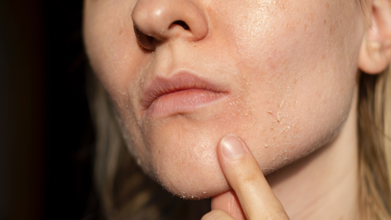- Health Conditions A-Z
- Health & Wellness
- Nutrition
- Fitness
- Health News
- Ayurveda
- Videos
- Medicine A-Z
- Parenting
Unexplainable Strokes Becoming Common In Young Folks Who Do THIS!

(Credit-Canva)
Being young is almost seen as a ‘get-away free’ card for many people. You feel energized and on top of the world, pulling all-nighters, then keeping up with all the course work and somehow have the time to party, without resting properly. This kind of mindset, while ok every now and then, encourages them to indulge in other activities like drinking, doing substances or smoking. Many of them start to believe that doing this at a young age will not affect their body, or have long-term side effects, but a new study shows that this may not be the case anymore. You may be under the assumption that strokes, diabetes and other issues like hypertension are all problems that people above 50 have, but the risk of stroke has now doubled even in youngsters.
A study published in Neurology Journals revealed a strong link between smoking and unexplained strokes, particularly in younger adults. The American Stroke Association says these strokes, known as cryptogenic strokes, happen when blood flow to the brain is blocked, but doctors can't easily find the cause. The research shows that if you smoke, your risk of having one of these strokes more than doubles. What's even more alarming is that heavy smoking makes the danger much higher. People who have smoked more than a pack of cigarettes every day for 20 years have over four times the risk of a stroke compared to people who have never smoked. This highlights how seriously smoking can damage your health, even at a younger age.
What Does This Mean For The Public?
The people who did this study think we need to work harder to stop young people from smoking, especially smoking a lot. They believe this will help stop young people from having strokes. They looked at a special kind of stroke that's hard to figure out, and not much is known about how smoking causes it in young people. They wanted to find out more. It's important to know the risks so young people can make good choices and stay healthy. According to the American Lung Association, 87% of adults who are daily smokers tried their first cigarrete by the age of 18 and 95% had by the age of 21.
To understand the connection between smoking and strokes in young adults, the researchers analyzed medical records. They compared two groups, young people who had experienced strokes and young people who hadn't. By examining these records, they could see how smoking habits correlated with stroke occurrences. The findings revealed that a significantly higher percentage of stroke victims were smokers compared to those who hadn't had strokes. Specifically, about one-third of the individuals who had strokes were smokers, while only 15% of those without strokes were smokers. This clear difference strongly indicates that smoking significantly increases the likelihood of young adults experiencing strokes.
Why Does This Kind Of Stroke In Younger People Pose A Problem?
More young people are having these hard-to-explain strokes. That's why this study is so important. The researchers found that smoking is a big reason why these strokes happen. Knowing this can help us stop people from having them. It's important to find the causes so we can prevent them.
The study also highlighted several factors that influence stroke risk in young adults. These include age, gender, and the intensity of smoking. Men who smoke are at a considerably higher risk of strokes compared to women who smoke or to men who don't smoke at all. Also, older young adults, even within the young age range, face a greater risk. Naturally, the more you smoke, the higher your risk becomes. Smoking heavily, especially over extended periods, is exceptionally dangerous. Even smoking a small amount regularly increases the risk compared to not smoking at all. These factors show that stroke risk is influenced by multiple elements related to smoking habits.
How Does Smoking Affect Your Body?
Cigarette smoke contains numerous harmful substances that damage the body, particularly the blood and blood vessels. These substances interfere with the blood's ability to carry oxygen, leading to oxygen deprivation in various parts of the body. Additionally, they elevate blood pressure, putting extra strain on the heart and blood vessels. Smoking also disrupts cholesterol levels, increasing the risk of arteries hardening, which further restricts blood flow. All these factors contribute to an increased risk of strokes. The cumulative effect of these harmful substances makes smoking extremely detrimental to cardiovascular health. It's a direct pathway to serious health problems.
Sources
https://www.neurology.org/doi/10.1212/WN9.0000000000000003
https://www.health.gov.au/topics/smoking-vaping-and-tobacco/about-smoking/effects
https://www.stroke.org/en/about-stroke/types-of-stroke/cryptogenic-stroke
https://www.lung.org/quit-smoking/smoking-facts/impact-of-tobacco-use/tobacco-use-among-children#:~:text=Cigarette%20smoking%20during%20childhood%20and,on%20lung%20growth%20and%20function.
Working Out For 10 Minutes May Decrease Your Risk Of Colorectal Cancer, Study Proves

Credit: Canva
Performing short and intense exercises that last for about 10 minutes may significantly reduce the risk of colorectal cancer, a British study shows.
Researchers at Newcastle University have found that completing brief workouts increases the concentration of several small molecules in the blood that have previously been linked to reducing inflammation, improving blood vessel function and metabolism.
The findings, which were published in the International Journal of Cancer, also noted that even short bouts of exercise can influence the activity of genes that govern tumor growth and fight against cancer.
Dr Sam Orange, Senior Lecturer in Clinical Exercise Physiology at Newcastle University and lead study author, said of the results, "What’s remarkable is that exercise doesn’t just benefit healthy tissues, it sends powerful signals through the bloodstream that can directly influence thousands of genes in cancer cells.
“It’s an exciting insight because it opens the door to find ways that mimic or augment the biological effects of exercise, potentially improving cancer treatment and, crucially, patient outcomes.
“In the future, these insights could lead to new therapies that imitate the beneficial effects of exercise on how cells repair damaged DNA and use fuel for energy.”
How Does It Work?
The study involved 30 participants, both male and female between the ages of 50–78. All of the participants were overweight or obese (a risk factor of cancer) but otherwise healthy.Researchers had asked each volunteer to complete a short, intense cycling test that lasted about 10 minutes and collected each of their blood samples which were then meticulously analyzed.
After studying about 249 proteins, the experts found nearly 13 protein had increased in their blood flow after the short exercise including interleukin-6 (IL-6), which helps repair the DNA of damaged cells.
When these exercise-induced proteins were applied to colorectal or bowel cancer cells by the scientists in a lab, they discovered that these new proteins could alter the activity of over 1,300 genes, particularly those who were responsible for DNA repair, energy production and cancer cell growth.
As a result, they concluded that performing even small exercises can activate a set of genes in the body's cells that can support efficient use of oxygen and promote energy metabolism. Additionally, the British researchers also discovered that the cell genes which have been previously associated with rapid cell growth were switched off after working out, suggesting that this might aid in controlling cancerous growths in the body.
What Is Colorectal Cancer?
Colorectal or bowel cancer is a common cancer that forms in the tissues of the colon (large intestine) or rectum, often starting as non-cancerous growths called polyps that turn cancerous over time.
Despite being treatable and preventable, colorectal cancer is currently the second leading cause of cancer-related deaths worldwide. Over 70,000 new cases of colorectal cancer occur annually in India, making it the fourth most common cancer in the country.
Typical symptoms usually include :
- Blood in or on the stool
- Changes in bowel habits (diarrhea, constipation, narrower stools)
- Abdominal discomfort, cramps, gas, or pain
- Feeling that your bowel doesn't empty completely
- Weakness, fatigue, or unexplained weight loss
Expert Explains: Why Do Allergies And Rashes Increase In Winter? According To Dermatologist

Credits: iStock
When temperature drops, so does the moisture even in your skin. This is what leads to a rash or allergies. In fact, with changes in temperature, and winters, our lifestyle changes too, this could also be the reason why we experience a winter rash, or allergies. To understand this better, Health and Me spoke to Dr Navjot Arora, Consultant Dermatologist, Dermaheal Skin and Clinic at Dwarka, Delhi, who explained that allergies and skin rashes tend to increase during winter due to both, environmental factors and changes in skin health. "Cold temperatures and low humidity levels reduce moisture in the air, leading to excessive dryness of the skin. When the skin becomes dry, its natural protective barrier weakens. This makes it more prone to irritation, inflammation, and allergic reactions."
Why Does Winter Weather Increase Chances Of Rashes And Allergies?
The doctor explains that during winter, people tend to stay indoors more, and it also increases their exposure to allergens like dust mites, mold, pet dander, and chemical fumes from heaters and cleaning products. "Limited ventilation and closed spaces allow these allergens to build up, triggering allergic responses and skin rashes, especially in individuals with sensitive skin or pre-existing conditions like eczema."
Cold weather also affects blood circulation to the skin. Reduced blood flow can slow down the skin’s repair process and weaken its defense against irritants and allergens. As a result, chronic skin conditions such as eczema, psoriasis, and contact dermatitis often worsen in winter, leading to itching, redness, flaking, and rashes.
Lifestyle Changes In Winter
Doctor also points out that during winters, our bathing habit changes. Dr Arora says, "Frequent hot showers strip away the skin’s natural oils, increasing dryness and irritation. In addition, wearing heavy woolen or synthetic clothing can cause friction, sweating, and contact allergies, particularly in skin folds, which can further contribute to rashes."
Common Symptoms Of Winter Rashes
- flushing
- swelling
- itching
- flaking skin
- sensitivity
- bumps
- blisters
If not treated well, or in time, it can develop into more serious health threat, especially if you have a family history of
- eczema or another type of dermatitis
- psoriasis
- rosacea
- allergies
- asthma
- sensitive skin
What Are The Cures To Winter Rashes And Allergies?
The rise in allergies and rashes during winter is largely linked to dry weather, indoor allergen exposure, and skin barrier damage. Maintaining proper skin hydration, avoiding harsh soaps, limiting hot water exposure, and wearing skin-friendly fabrics can help reduce the risk of winter-related allergies and skin rashes.
Moisturizers are usually the first line of care for dry skin because they help trap moisture and prevent further dryness. Apply them multiple times a day, especially after bathing or washing your hands. Thicker options like creams or ointments tend to keep skin hydrated longer than lighter lotions.
Petroleum jelly can also be effective, as it forms a protective barrier that seals in moisture. If you prefer to avoid petroleum-based products, alternatives like Waxelene or Un-Petroleum work in a similar way to reduce moisture loss.
Natural virgin oils, such as coconut oil, may help calm irritated skin and restore hydration. Use them on areas that are not acne-prone, and always do a patch test on a small area for 24 hours before wider application.
Oatmeal-based soaps or oatmeal baths can also help soothe dry, itchy skin. You can buy ready-made oatmeal soaps or add finely ground oats to a warm bath and soak for about 10 minutes.
For itching and inflammation, topical hydrocortisone creams, available over the counter or by prescription, may provide relief. Always follow the instructions on the label or use them as advised by a doctor.
Disclaimer: This is not a substitute for actual prescribed medicine. Please consult a doctor before you purchase any medicine or ointment for your rashes.
Are You Taking Clonazepam? NHS Issues Urgent Safety Advice

Credits: Canva
The NHS has released updated guidance for people who are currently taking clonazepam, a commonly prescribed medicine that belongs to the benzodiazepine group. According to the health service, clonazepam is often used to control seizures or fits linked to epilepsy, ease involuntary muscle spasms, and help manage panic disorders. It is also prescribed in some cases for people with restless legs syndrome (RLS). NHS Inform notes that “around 1 in 10 people experience restless legs syndrome at some stage in their life.”
Explaining how the drug works, the NHS says it increases levels of gamma-aminobutyric acid (GABA), a chemical in the brain that has a calming effect. By boosting GABA, clonazepam can reduce anxiety, prevent seizures or fits, and relax tight or overactive muscles.
Who Can Take Clonazepam?
Clonazepam is only available on prescription and comes as tablets or a liquid. Most adults aged 18 and over can take either form. In certain cases, children as young as one month old may be prescribed clonazepam to treat epilepsy, as per NHS.
That said, there are situations where extra caution is needed. People who are due to have surgery or dental treatment, those who are pregnant, trying to conceive, or who have sleep-related conditions may be advised to stop taking the medicine. However, these are not the only groups the NHS says should be careful.
Clonazepam is not suitable for everyone. Before starting treatment, patients are advised to tell their doctor if they:
- have ever had an allergic reaction to clonazepam or any other medicine
- have myasthenia gravis, a condition that causes muscle weakness
- have sleep apnoea, which affects breathing during sleep
- have lung, liver, or kidney problems
- have spinal or cerebellar ataxia, which can cause shakiness, poor balance, and slurred speech
- have had problems with alcohol or drug use in the past
- have recently experienced bereavement, depression, or thoughts of self-harm or suicide
- have been diagnosed with a personality disorder
- are trying to get pregnant, are already pregnant, or are breastfeeding
- are due to have a general anaesthetic for an operation or dental procedure
What Are The Side Effects Of Clonazepam?
Like many medicines, clonazepam can cause side effects. Common effects, which affect more than 1 in 100 people, include disturbed sleep such as vivid dreams, feeling sleepy during the day, light-headedness, dizziness, unsteadiness, and muscle weakness.
When it comes to long-term use, the NHS warns that clonazepam can lead to withdrawal symptoms if taken for a prolonged period. Because of this risk, people who have been prescribed the drug for more than four weeks may have their dose reduced slowly when stopping treatment, rather than stopping suddenly.
The NHS also stresses that this is not a complete list of side effects. Patients are advised to read the information leaflet that comes with their medicine for full details.
Clonazepam: Serious Side Effects To Watch Out For
Although uncommon, some people may experience serious side effects while taking clonazepam. The NHS advises contacting a doctor or calling 111 immediately if you notice:
- yellowing of the whites of the eyes or skin, which may be less noticeable on darker skin tones, as this could point to liver problems
- seeing or hearing things that are not there, or believing things that are untrue
- problems with coordination or controlling movements
- swollen ankles, a fast heartbeat, coughing, and extreme tiredness, which could be signs of heart issues
- easy bruising, fatigue, nosebleeds, and breathlessness, which may indicate blood disorders
- changes in mood, such as talking more than usual, feeling unusually excited, restless, irritable, or aggressive, which are more likely in children or adults over 65
- Anyone experiencing memory problems, such as difficulty remembering things or amnesia, is advised to book an appointment with their doctor.
In rare cases, clonazepam can trigger a serious allergic reaction known as anaphylaxis.
Disclaimer: This article is for informational purposes only and is not intended as a substitute for professional medical advice, diagnosis, or treatment. Always consult a qualified doctor, pharmacist, or healthcare provider before starting, stopping, or changing the dosage of any medication.
© 2024 Bennett, Coleman & Company Limited

